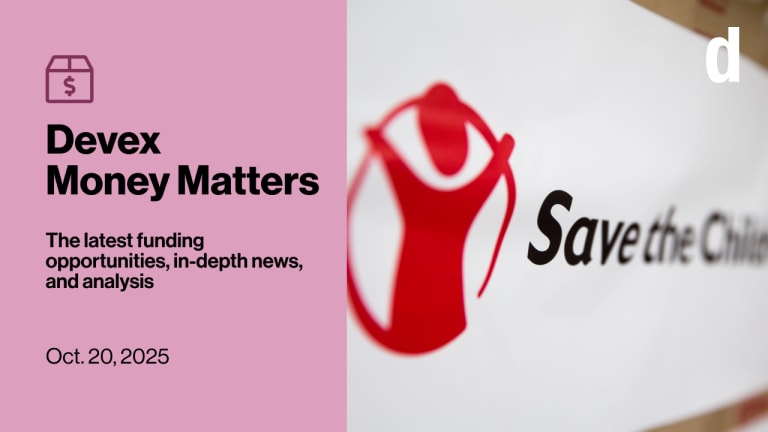
A number of health and education experts in Europe are increasingly concerned that the 4 percent drop in official development assistance in 2012 – reported by the Organization for Economic Cooperation and Development in a statement on Wednesday – is disproportionately affecting the social sectors and are worried about future funding opportunities.
The OECD blamed the decrease on the continuing financial crisis, especially in the euro area, which has prompted several European Union member state governments to tighten their development budgets.
According to Oxfam’s Catherine Olier, the cuts did not come as a surprise: “The decrease was expected because a lot of countries did not meet their commitments.”
However, she was surprised by the sheer scale of the decrease, particularly in countries such as Spain, which saw a 49.7 percent decrease in its 2012 ODA.
Peter Schaffler, a policy officer at Marie Stopes International, noted that support for the social sectors is “becoming more and more challenged in EU and Commission policies, and in funding opportunities – especially future funding opportunities. It seems that the drop in ODA is mostly affecting these sectors,” he said.
“Furthermore,” he asserted, “since development aid is only a small part of the budget, we need to consider cuts in development aid as much a political signal as a result of the crisis.”
However, according to some, the cut in ODA could spur member states to look for innovative ways to finance aid.
“We hope that countries commit their 0.7 percent pledge, but also look at other solutions, such as providing new resources in the form of financial transaction taxes, which could go to development and climate change,” Olier said.
Others see it as an opportunity to improve the efficiency and efficacy of aid delivery.
“In times of austerity, aid should be targeted to those interventions that are most cost effective and that generate best results – an example is investing in family planning where investments actually reduce the burden on the health system in such a way as to actually free up funding,” Shaffler said.
For Neil Datta, secretary of the European Parliamentary Forum on Population and Development, an independent network of European parliamentarians committed to improving women’s reproductive health and rights, the OECD-DAC results were not unexpected, but nonetheless disappointing.
Datta took time out to talk with Devex about the implications of the fall in EU ODA.
While believing that austerity could actually spur innovative solutions to scaling up impact, he predicted further falls in the years ahead and shared his concerns about the de-prioritisation of population assistance among donors, the future of aid to the least developed countries, India’s “forgotten poor” and the need for world leaders to honour their pledges.
EU aid spending has fallen again this year, with only limited exceptions. Should we expect to see further cuts in the coming years?
Regrettably it would appear that this will be the case. The OECD has predicted that funds from donors will fall until 2016, and given the prevailing mood of austerity across Europe at present, it is hard to see this changing. For the sexual and reproductive health and rights community this is doubly worrying; as we reported in Euromapping 2012 [a joint EPF and DSW collaboration], we have also seen that the prioritisation of population assistance within development assistance has fallen for many donors in the past two years. The reproductive wellbeing of the world’s most deprived women and girls – and their ability to raise healthy families that they can support – therefore stand to receive less attention. A healthy society needs healthy mothers, and the consequences of this two-fold reduction in the attention that mothers receive stands to impact all other areas of development negatively.
How do national aid agencies or in-country NGOs plan to overcome this reduced funding?
It is clear that austerity and falling aid budgets are the new reality for the development community, and that this is not going to change in the near future. Whilst clearly being an enormous cause for concern, there is one positive consequence of this new era of tightened purse strings. Now we need to make sure we spend our money cleverly and carefully. I am sure that there are lots of smart spending solutions that we will find to maximize the results that our limited resources achieve. Family planning is one of these smart solutions. Studies have shown that every dollar spent on family planning can save up to $6 on health, housing, water, and other public services in Africa and up to $13 in South Asia. So it saves money, and it allows people to live healthy, empowered and decent lives with dignity.
We must also get our leaders to interact with their counterparts in emerging economies to share with them their understanding of the necessity and the benefits that they will receive if they confront global poverty. If they adjust their policies to redistribute their wealth more fairly internally, and become international donors to countries that are less affluent than they are, then the funding void that Western austerity is causing can be filled by a new generation of international donors.
Did the cuts come as a surprise?
No, and given the imperative that there is for cutting spending at the moment this should make us hold up, champion and support the countries that are managing to protect their aid budgets: countries like the U.K., Sweden and Luxembourg.
Which countries and what types of sectors will be most badly hit?
From the OECD’s figures, it is worrying to see that countries such as Niger, Burundi and Chad are at risk of falling off the development community’s radar. The least developed countries clearly need the most help from international donors. However, this view of poverty can also be misrepresentative of the overall statistics for global poverty. It has been calculated that there are more people living in poverty in India than in the 26 poorest countries of Africa. Even though India is experiencing an impressive leap in its development, this improvement for its most rich does not mean we should forget about its most poor.
In the field of population assistance it is essential that recent commitments – such as the 2010 Muskoka Initiative, where G-8 countries committed to mobilizing $5 billion of additional funding over the next five years towards maternal, newborn and child health, or the 2012 London Family Planning Summit, where donors made new financial commitments amounting to $2.6 billion to enable 120 million women in the world’s poorest countries to gain access to contraceptives by 2020 – do not fall victim to the cuts. These priorities must remain priorities, and the world’s leaders must honour their pledges.
What problems are the cuts likely to cause to staffing levels?
We have heard assorted reports of the problems that staffing cuts are causing at all levels – from governments in donor and partner countries to health workers in hospitals and clinics on the ground. All areas are facing the severe risk of losing staff and expertise. What’s more, given that funding to multilateral institutions is also falling, international donors seem to be choosing to turn their backs on one of the safest places they can invest their funds, as multilateral institutions – such as the U.N. specialised agencies – have the expertise they require in-house, which means they require less follow-up from the donor governments that are funding them.
Read more development aid news online, and subscribe to The Development Newswire to receive top international development headlines from the world’s leading donors, news sources and opinion leaders — emailed to you FREE every business day.








